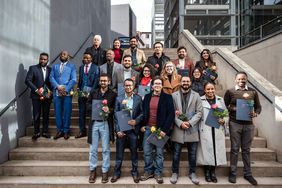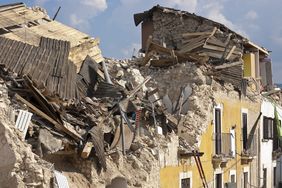
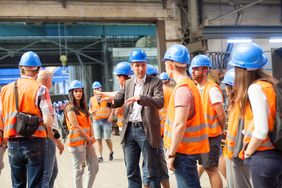
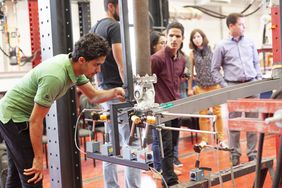
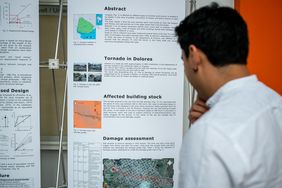
Progress Through Education: DAAD Supports International Experts from Weimar
The German Academic Exchange Service (DAAD) is funding the English-taught »Natural Hazards and Risks in Structural Engineering« (NHRE) Master's degree programme at the Bauhaus-Universität Weimar with nearly 850,000 euros. This funding will go towards full scholarships for students from developing and industrialising countries and annual grants for tutorials until 2032. Scholarship recipients acquire the technical skills required for planning, construction, and redeveloping in high-risk areas. Once students have successfully completed the programme, they are expected to bring their knowledge back to their home countries as international experts and contribute to sustainable development.
Earthquakes, floods, storms - extreme weather conditions and natural disasters pose major challenges for civil engineers. In order to minimise risks and mitigate imminent damage, Bauhaus-Universität Weimar students are trained to be experts with the technical knowledge for designing/planning buildings and infrastructure that can withstand extreme conditions. In this way, the »Natural Hazards and Risks in Structural Engineering« degree programme contributes to overcoming regional and global challenges, especially in high-risk areas. »The programme focusses on the qualification of engineers from developing countries in order to prepare them for taking on tasks in their home countries«, explains programme director Jr. Prof. Lars Abrahamczyk from the Bauhaus-Universität Weimar.
This is where the DAAD funding for the »Development-Related Postgraduate Courses« (EPOS) comes in. The funding supports selected students from developing countries by providing them with individual scholarships. »The EPOS scholarship allows talented engineers with a Bachelor's degree and at least two years of professional experience to complete their Master's degree at the Bauhaus-Universität Weimar, where they benefit from the innovative and first-class research projects, research infrastructure, expertise, and resources available at the Bauhaus-Universität Weimar. Students are integrated and involved in current research projects, in particular in the form of student projects. This allows us to foster intercultural exchange and cooperation between researchers from different countries with the goal of achieving a deeper understanding of global research issues«, explains Abrahamczyk.
The aim of the DAAD is to increase the number of qualified graduates in degree programmes across all fields and to network them internationally so that they can initiate and oversee mid- and long-term development projects as experts in their own countries. A total of 42 degree programmes receive funding, including the NHRE Master’s degree programme in Weimar.
Network Meeting in Weimar
Since 2014, the »Natural Hazards and Risks in Structural Engineering« programme has been a member of the German Association of Postgraduate Programmes with Special Relevance to Developing Countries (AGEP). The AGEP is an association made up of over 50 German postgraduate degree programmes in the fields of natural sciences, engineering, regional, environmental, and agricultural sciences, social sciences, economics, and medicine. These programmes are united in their shared mission to foster sustainable development in the students’ home countries and to train them to become what the UN refers to in its Sustainable Development Goals as »Change Agents«. At least five of the »Sustainable Development Goals« (SDGs) are included in the NHRE degree programme, including the goals of quality education, achieving gender equality and empowering all women and girls, and taking measures to combat climate change.
The funded NHRE postgraduate degree programme will be presented at an AGEP network meeting on 25 April 2025 at the Bauhaus-Universität Weimar. The meeting will focus on the AGEP study programmes’ exchange on the promotion of specialists and leaders in developing countries as well as the exchange with the DAAD.
Further information on AGEP: www.agep-info.de
In case of questions, please contact Jr. Prof. Lars Abrahamczyk, Bauhaus-Universität Weimar, Professorship of Advanced Structures, via e-mail: lars.abrahamczyk[at]uni-weimar.de or by phone at +49 (0) 36 43/58 41 03.
Kontakt
Bauhaus-Universität Weimar
Claudia Weinreich
Pressesprecherin
Tel.: +49(0)3643/58 11 73
Luise Ziegler
Mitarbeiterin Medienarbeit
Tel.: +49(0)3643/58 11 80
Fax: +49(0)3643/58 11 72
E-Mail: presse[at]uni-weimar.de
Web: www.uni-weimar.de/medienservice

